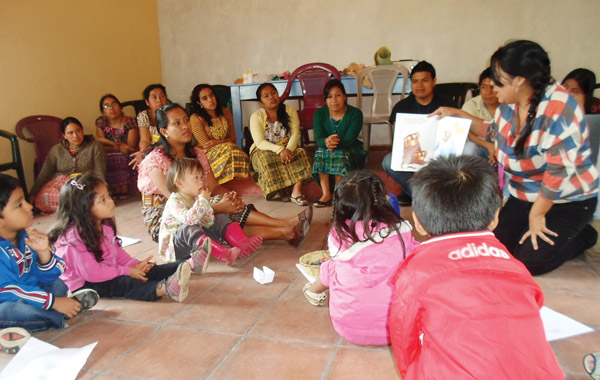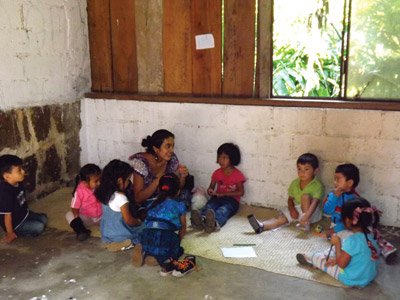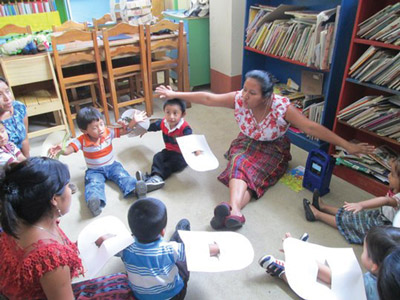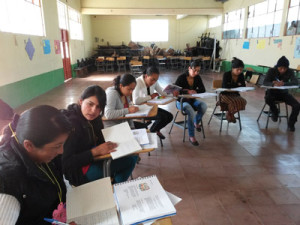Guatemala’s Magical Classroom
The nonprofit group Let’s Be Ready developed ‘Aula Mágica’ (Magical Classroom) to bring vital preschool education to remote regions of Guatemala.
Every morning, teens walk mountain roads in rural Guatemala carrying magic in their backpacks. When they reach their destinations—community centers, churches, homes—they’re greeted by excited preschoolers who scramble into a circle, eager for the fun to begin.
The teens pull from their backpacks small tablet computers loaded with music, lessons and laughter. When they tap “play,” the room fills with the voices of a teacher and his students magically transforming these makeshift classrooms into centers for success.
Children in isolated Guatemalan villages have no preschool teachers and experience little socialization. Up to 40 percent fail the first grade, and either repeat or simply drop out. The nonprofit group Let’s Be Ready developed “Aula Mágica” (Magical Classroom) to bring vital preschool education to these remote regions through audio lessons downloaded onto tablet computers.
The program applies Montessori and Creative Curriculum principles to prepare 5 and 6 year olds with the basic knowledge they need to succeed in the first grade, turning that 40 percent failure rate into a 95 percent rate of success.
Aula Mágica also tackles another critical problem in remote regions: smart teens without jobs. With no direct access to secondary school and few job prospects, local teens can’t serve as certified teachers, but they can lead Aula Mágica classes as education promoters, and even earn enough money to complete secondary school and become teachers.
“If we tried to get more certified preschool teachers to rural areas, it would take decades,” says program director Michael Estill. “But with Aula Mágica, in just a few years every community in Guatemala could have access to a program for preschool preparation.”
Promoters ages 16 and up are selected for their enthusiasm, creativity, literacy and interest in improving their community. They take full responsibility for everything in the classroom, from working with students and parents, arranging for learning spaces, and providing ongoing feedback about the program materials. They also play a dynamic role in the classroom, pausing the audio program every few minutes to engage the children in activities reinforcing each lesson.
“The kids run around flying like airplanes; they go out to find different fruits or colors. They participate,” says Fred Zambroski, Aula Mágica creator and Let’s Be Ready founder. By the end of the year, the children have the basic knowledge and classroom experience they need to succeed in first grade.
Three Guatemalan volunteers create the magic behind Aula Mágica. Quirio Ixtamer Perez, a special needs teacher, radio personality, actor and clown, records all of the lessons, and he, his wife, and their three children play all the parts. Actress, artist and musician Rosa Maria Ruiz Porras writes all lesson scripts. And schoolteacher Lucy Diaz trains the promoters, develops materials and ensures that all both the lessons and activity guide address core competencies and link with Guatemala’s national curriculum.
In 2015, Aula Mágica competed in the $15 million Global Learning XPRIZE competition, which promotes using tablet technology to “empower children to take control of their own learning,” according to the XPRIZE website. Zambroski and Estill hope to recruit Guatemalan technology experts to lead their tech team.
“Basically, we’re looking at making this an open-source program that can be easily replicated,” says Estill. “Something that could expand to as many people as want to use it,” Zambroski adds. “It’s an organic, constantly changing curriculum. The promoters in the field tell us what works and what doesn’t, and create new ideas for it. It’s quite a mental shift.”
Begun as a small 2014 pilot in San Pedro la Laguna, the Aula Mágica has rapidly expanded to 18 rural Guatemalan communities and is now available only in Spanish but is being translated into Mayan languages. Several libraries and groups in Guatemala and Mexico have expressed interest in adopting it, and Zambroski couldn’t be happier. “I’m 70 years old,” he says, “and I hope to see this become international and grow in hundreds of places in my lifetime.”
To learn more about Aula Mágica, go to audio-preschool-for-rural-guatemala-youth or do a search at GlobalGiving.com. For more information, contact Michael Estill (Michaeljestill@gmail.com).
REVUE’s Community Service article by Linda Conard




This is such an exciting win-win project. Promoting creativity and access to learning for pre-school age, rurual kids while also training and employing unemployed teens! So happy to know that this is happening here in Guatemala. And also kudos for the generosity and vision of its founders.
There is hope. Thank God for volunteers that are doing that.
I had the very special honor, while in Guatemala volunteering with Global Habitat, to visit an Aura Magica classroom in San Juan. As a 30 year now retired public school teacher and principal, I cannot provide enough verbal or written applause for the teaching methods used, the enthusiastic teacher, the techniques employed, the adorable and attentive students as well as the Program Director, Michael Estill. This program is one which
could and should be replicated by others. It is extremely effective and ever-so efficient!
I shall find ways for the rest of my years to support Aula Magica. Kudos to all!